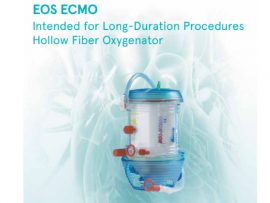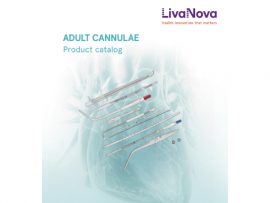Abstract When determining extracorporeal oxygen transfer (VMLO2) during venovenous extracorporeal membrane oxygenation (VV ECMO) dissolved oxygen is often considered to play a subordinate role due to its poor solubility in..
Lire la suiteAbstract Continuous negative abdominal pressure (CNAP) therapy effectively provides respiratory support in patients with respiratory failure and severe obesity; however, its use in clinical practice remains limited. In this case,..
Lire la suiteAbstract Objectives: To describe clinical characteristics, mechanical ventilation strategies, and outcomes in patients with severe acute respiratory distress syndrome (ARDS) during weaning from venovenous extracorporeal membrane oxygenation (VV ECMO). Design: Retrospective, multicenter cohort..
Lire la suiteAbstract A 53 year old female was referred to our quaternary center for venovenous extracorporeal membrane oxygenation (ECMO) retrieval. Following a brief admission for a cosmetic procedure, she had represented..
Lire la suiteAbstract Background Use of venovenous extracorporeal membrane oxygenation (ECMO) is increasing, but candidacy selection processes are variable and subject to bias. Research Question What are the reasons behind venovenous ECMO..
Lire la suiteAbstract Microfluidic membrane oxygenators are designed to mimic branching vasculature of the native lung during extracorporeal lung support. To date, scaling of such devices to achieve clinically relevant blood flow..
Lire la suiteAbstract Purpose: Venovenous extracorporeal membrane oxygenation (VV-ECMO) can be used to support patients with refractory acute respiratory failure, though guidance on patient selection is lacking. While age is commonly utilized..
Lire la suiteAbstract Background Central nervous system (CNS) injury following initiation of veno-venous extracorporeal membrane oxygenation (VV-ECMO) is common. An acute decrease in partial pressure of arterial carbon dioxide (PaCO2) following VV-ECMO..
Lire la suiteAbstract Refractory hypoxemia (RH) during venovenous extracorporeal membrane oxygenation (VV ECMO) support is a complex problem that limits the benefit of this therapy. The need for sustained deep sedation and..
Lire la suiteAbstract Objective To identify and compare the rates of cannula-associated (CaDVT) on venovenous (VV-ECMO) who receive systemic (AC) and those who do not receive AC. Design Retrospective observational study. Setting Tertiary academic medical center...
Lire la suiteAbstract Importance: Skin pigmentation influences peripheral oxygen saturation (SpO2) measured by pulse oximetry compared to the arterial saturation of oxygen (SaO2) measured via arterial blood gas analysis. However, data on..
Lire la suiteAbstract Objectives We aimed to evaluate thrombotic and hemorrhagic complications with heparin versus bivalirudin use in veno-venous extracorporeal membrane oxygenation (V-V ECMO). Methods We performed a retrospective cohort study of..
Lire la suiteAbstract Venovenous extracorporeal membrane oxygenation (VV-ECMO) is a life-saving therapy for critically ill patients, but it carries an increased risk of thrombosis due to blood interacting with non-physiological surfaces. While..
Lire la suiteAbstract Unfractionated heparin (UFH) is the most used anticoagulant in patients receiving veno-venous extracorporeal membrane oxygenation (VV-ECMO). Its therapeutic levels are monitored using activated partial thromboplastin time ratio (aPTTr) or..
Lire la suiteAbstract Importance Prone positioning may improve outcomes in patients with severe acute respiratory distress syndrome (ARDS), but it is unknown whether prone positioning improves clinical outcomes among patients with ARDS who..
Lire la suiteAbstract Rationale: Definitive guidelines for anticoagulation management during veno-venous extracorporeal membrane oxygenation (VV ECMO) are lacking, while bleeding complications continue to pose major challenges. Objectives: To describe anticoagulation modalities and..
Lire la suiteAbstract A restrictive fluid strategy is recommended in patients with acute respiratory distress syndrome (ARDS) managed with venovenous extracorporeal membrane oxygenation (VV ECMO). However, there are no established predictors for..
Lire la suiteAbstract Mortality prediction for patients with the severe acute respiratory distress syndrome (ARDS) supported with veno-venous extracorporeal membrane oxygenation (VV-ECMO) is challenging. Clinical variables at baseline and on day 3..
Lire la suiteAbstract Background: Extubation while receiving V-V ECMO is being considered earlier for patients with respiratory failure. This can facilitate early mobilization, participation in physical therapy, and reduce the potential consequences of..
Lire la suiteAbstract Introduction Most patients on extracorporeal membrane oxygenation (ECMO) decease during therapy on the system. However, the actual causes of death have not been studied sufficiently. This study analyses the..
Lire la suiteAbstract Background: Hospitalized COVID-19 patients with hypoxemic respiratory failure may deteriorate despite invasive mechanical ventilation and thus require extracorporeal membrane oxygenation (ECMO) support. Unfractionated heparin (UFH) is the antithrombotic of..
Lire la suiteAbstract Obesity is associated with an overall increased risk of morbidity and mortality. However, in patients with critical illness, sepsis, and acute respiratory distress syndrome, obesity may be protective, termed..
Lire la suiteAbstract Introduction and Methods We examined the relationship between 24-h pre- and post-cannulation arterial oxygen tension (PaO2) and arterial carbon dioxide tension (PaCO2) and subsequent acute brain injury (ABI) in..
Lire la suiteAbstract Purpose Ultraprotective ventilation in (ARDS) patients with veno-venous (VV ECMO) reduces mechanical power (MP) through changes in positive end-expiratory pressure (PEEP); however, the optimal approach to titrate PEEP is unknown. This..
Lire la suiteThis case reports on a 41-years old male with no significant medical history who was admitted to the emergency room following 25% total body surface area (TBSA) deep partial thickness..
Lire la suiteAbstract Objective: Analysis of the prevalence and risk factors for weaning failure from venovenous extracorporeal membrane oxygenation (VV-ECMO) in patients with severe acute respiratory insufficiency. Design: Single-center retrospective observational study. Setting: Sixteen beds medical ICU at the University..
Lire la suiteAbstract Background Extracorporeal membrane oxygenation (ECMO) is a recognized method of support in patients with severe and refractory acute respiratory distress syndrome (ARDS) caused by SARS-CoV-2 infection. While veno-venous (VV)..
Lire la suiteAbstract Patients with respiratory failure may remain hypoxemic despite treatment with venovenous extracorporeal membrane oxygenation (VV-ECMO). Therapeutic hypothermia is a potential treatment for such hypoxia as it reduces cardiac output (�˙�) and oxygen consumption. We modified a previously..
Lire la suiteAbstract Mechanical ventilation for respiratory failure due to COVID-19 is associated with significant morbidity and mortality. Veno-venous extracorporeal membrane oxygenation (ECMO) is an attractive management option. This study sought to determine the effect..
Lire la suiteAbstract Severe acute refractory respiratory failure is considered a life-threatening situation, with a high mortality of 40 to 60%. When conservative oxygenation methods fail, a lifesaving measure is the introduction..
Lire la suite














